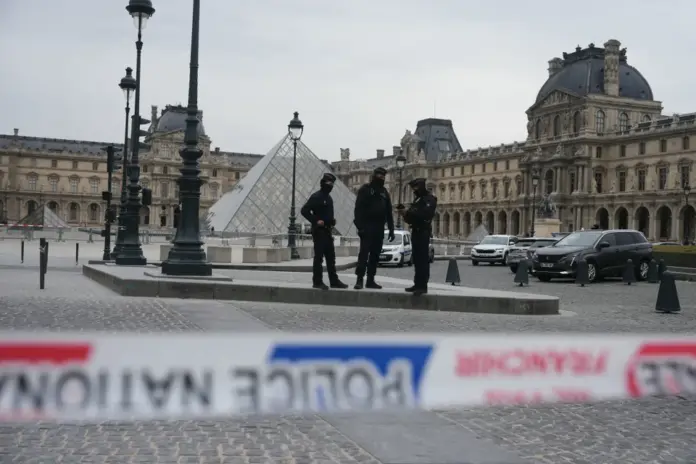The spectacular Louvre robbery on October 19 wasn’t just a blow to France’s cultural pride, it marked a crack in the national edifice. And as the investigation after the Louvre heist unfolds, two suspects have been arrested, but the crown jewels are still missing. A state caught flat-footed, a museum exposed, and a heritage betrayed, this is no longer just a news item, but a symbol of something deeper.
What we thought we knew about the Louvre heist
A quick reminder: on October 19, at around 9:30 AM, a group of thieves disguised as construction workers used a truck with an aerial lift to scale the Louvre’s river-facing façade and broke into the Apollo Gallery. Within seven minutes, they vanished with eight priceless royal jewels, including pieces worn by Empress Eugénie and Marie-Louise. The loot is estimated at €88 million (~$102 million).
At the time, French authorities described it as an “unthinkable breach of cultural security.” Now, those words sound more like spin than substance.
Arrests shake the case, but the key pieces remain missing
Over the weekend, two men in their 30s were taken into custody. One was intercepted at Charles de Gaulle airport attempting to flee to Algeria; the other was caught in Seine-Saint-Denis, allegedly preparing a route toward Mali.
These developments gave the impression of movement, but let’s be clear: not a single one of the key jewels has been recovered. The Paris prosecutor’s office, unusually opaque, confirmed the arrests but refused to reveal the suspects’ identities, or even whether they were acting alone.
Investigators reportedly found:
- Tools like grinders and torches
- A yellow vest used to disguise the operation
- DNA evidence and fingerprints at the scene
- A damaged royal crown, believed to be that of Empress Eugénie
Yet these are scraps. The crown was damaged, and none of the other seven jewels has resurfaced.
The Louvre transfers its treasures, and its embarrassment
In a move that reeks more of panic than protocol, the Louvre has now transferred its remaining royal jewels to the Banque de France under police escort — a decision not announced, but leaked to the press.
This response confirms what many suspected: internal confidence is collapsing. French cultural institutions are scrambling to save face, and the Ministry of Culture has announced a “full security audit” of all national museums. But if this is damage control, it comes far too late.
Investigation after the Louvre heist reveals state fragility
Let’s name it: the investigation after the Louvre heist has become less about recovering artifacts and more about protecting the image of the Republic.
The implications run deeper than a stolen necklace:
- Security cameras were down in the area breached, as admitted by Louvre director Laurence des Cars
- The escape was executed on scooters, echoing organized gang operations in Paris
- The jewel room was hit during open hours, suggesting inside knowledge or utter incompetence
Most damning of all? French officials admit the first 48 hours are critical for recovering such pieces. We’re well past that. According to jewelry crime experts, once stones are pried out and gold is melted down, “they’re gone.”
For a nation that prides itself on its cultural legacy, this isn’t just theft — it’s humiliation on the global stage.
What’s next, and what’s still at stake
Beyond the arrests, what matters now is:
- Will the jewels be found?
- How deep does the network go? Are there foreign handlers involved?
- Who enabled this breach? Insider help is still a leading theory
- Will there be accountability? Or will the French public once again be served press conferences instead of justice?
And perhaps most urgent: What signal does this send to France’s adversaries, both criminal and geopolitical?
If the crown jewels can vanish from the Louvre in daylight, what else might be vulnerable? In this sense, the case is no longer just criminal. It’s symbolic. And symbols, in times of national doubt, are weapons.
Conclusion
The arrests may give the illusion of progress, but until the jewels are back, whole, intact, on display, the State stands exposed. The investigation after the Louvre heist has lifted the veil on security failures, bureaucratic opacity, and the fragility of France’s institutional pride.
This isn’t just about theft, it’s about trust. And right now, that too is missing.



